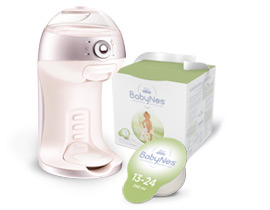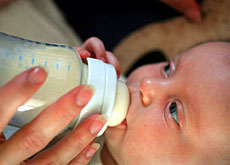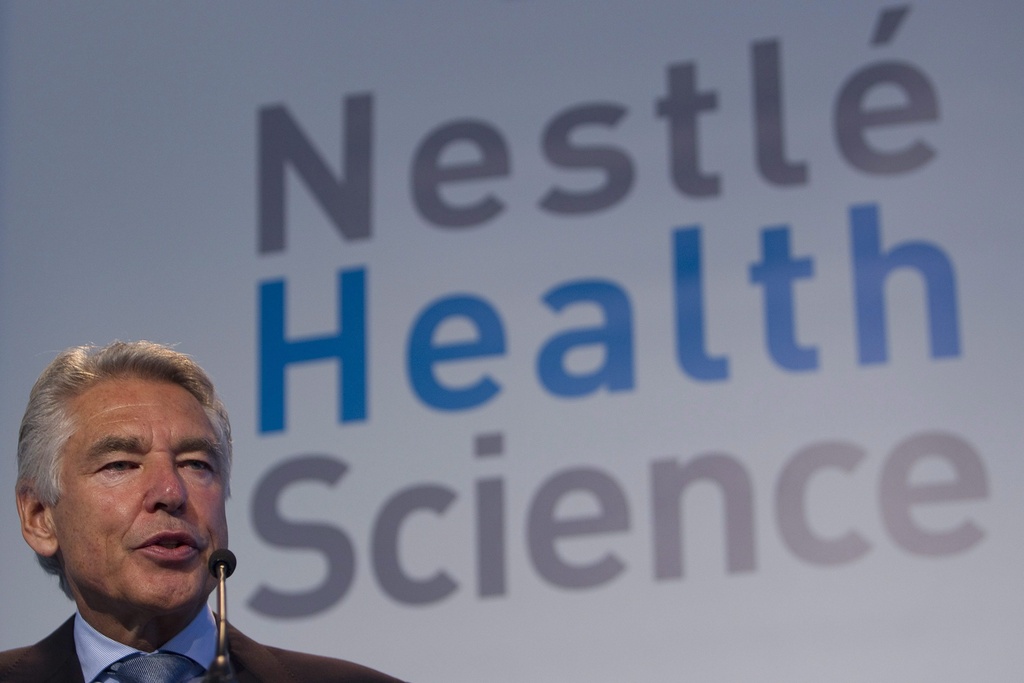Baby milk “Nespresso” machine draws fire

Nestlé stands accused of encouraging mothers to stop breastfeeding over a new lifestyle consumer machine that dispenses substitute baby milk formula from capsules.
Its BabyNes product, built along the lines of its successful Nespresso coffee machine, has reignited a long standing debate about the morality and possible health implications of commercialising breast milk alternatives.
The machine, that is being trialed in Switzerland, mixes capsules of baby milk formula with filtered water to quickly produce bottles for infants. The high-end machine costs SFr249 ($295) with packets of 26 capsules setting people back between SFr49 and SFr55 – four times the cost of Nespresso coffee.
Nestlé said it is providing a convenient product for mothers who are unable to breast feed by producing a bottle in less than 30 seconds. The firm denied that it is advocating an alternative to World Health Organization (WHO) advice.
“Nestlé supports exclusive breastfeeding for the first six months, in line with WHO recommendations, and continued breastfeeding thereafter while progressively introducing solid food into the infant’s diet,” the company said in a statement.
Inventions to scandal
Breast feeding campaigners have accused the Vevey-based concern of rampant commercialism that could come at the expense of infant health.
“This toy for the rich is putting across the idea that parents can trust a machine to meet the needs of their babies,” Patti Rundall of Baby Milk Action, told swissinfo.ch.
When Nestlé founder Henri Nestlé invented the Farine Lactée breast milk substitute powder 145 years ago, it was hailed as an infant health breakthrough that would help mothers who were unable to breastfeed – and their babies.
But the 1970s saw a scandal erupt around the formula following its sale in developing countries. Infant deaths were blamed on contaminated water being mixed with the powder while Nestlé was accused of encouraging mothers to stop breastfeeding with aggressive marketing practices.
The outcry resulted in damaging publicity for Nestlé and a coordinated attempt by campaigners to call on consumers to boycott the company’s goods.
The WHO intervened in 1981 to put guidelines into place that prohibited direct marketing in developing markets while many countries implemented their own legislation.
Marketing or information?
Rundall believes that Nestlé’s press release highlighting the new BabyNes product infringes that code.
“This press release was picked up by the world’s media and I have seen articles from many countries,” she said. “This is not just a consumer product like a coffee machine and information should be passed on via health care experts.”
Nestlé disagreed with this interpretation, stating: “We fully comply with the WHO Code of Marketing of Breast Milk Substitutes as implemented by national governments. We take all allegations of non-compliance with the WHO seriously.”
WHO said it does not comment on commercial products.
Nestlé said it would evaluate the potential introduction of BabyNes into other markets, but would not expand on whether developing economies could be targeted in future.
Made for Angelina
The price tag of the product would put off low income consumers, but Swiss campaigning group Berne Declaration believes it could set a negative aspirational trend in developing economies.
“During the previous scandal, the lifestyle message [feeding with baby formula] came from developed markets to developing ones,” spokeswoman Andrea Hüsser told swissinfo.ch.
“The current trend is manipulating young mothers into believing infant feeding is a lifestyle event like drinking Nespresso.”
Nestlé claims a filtration system in the BabyNes machine has tackled the problem of contaminated water being used to mix the powder. “The use of boiled water is therefore not required,” the company stated.
The company also defended the safety of its powdered formula after earlier independent tests of a range of brands had shown some to be contaminated with bacteria.
“The safety and quality of our products is a non-negotiable priority for Nestlé,” the firm said.
It remains to be seen how commercially successful such a product will prove to be. Nestlé’s premium coffee capsule machine Nespresso is expected to achieve sales of more than SFr3 billion ($3.56 billion) this year.
But Sara Stalder, head of the Swiss Consumer Protection Association, had a scornful message for the product on her blog on the CPA’s website.
“For me it’s clear that this machine would be ideal for Angelina Jolie: with six children and a deep purse, such a machine would be perfect,” Stalder wrote.
The issue of baby milk formula first drew international criticism in the 1970s following the death of infants in developing countries.
Campaigners argued that poor sanitary conditions and poverty in many countries put babies at risk from using such formulas.
The main reasons were the use of unsanitary water and the danger of some mothers cutting down on the amount of formula used to save money.
Breastfeeding campaigners also argue that formula cannot provide the same natural anti-bodies as are found in breast milk and that protect infants from infection.
Nestlé, the inventor of baby milk formula, was primarily in the firing line of such criticism that stoked calls for a boycott of the company’s products.
In 1981, the World Health Assembly – the decision making body of the World Health Organization (WHO) – drew up a code of conduct for the sale and marketing of baby milk substitute products.
These included a ban on direct marketing of formulas, handing out free samples or any form of contractual arrangements between companies and mothers.
WHO recommends that infants should be solely fed breast milk where possible in the first six months of life.

In compliance with the JTI standards
More: SWI swissinfo.ch certified by the Journalism Trust Initiative















You can find an overview of ongoing debates with our journalists here . Please join us!
If you want to start a conversation about a topic raised in this article or want to report factual errors, email us at english@swissinfo.ch.